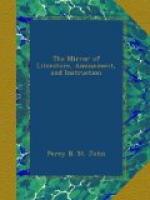F.
* * * * *
LEGAL RHYMES.
(For the Mirror.)
According to Goguet, “the first laws of any people were composed in verses, which they sang;” and why should it not be so when Apollo was one of the first of legislators? and under his auspices they were published to the sound of the harp. Pittacus, one of the seven sages of Greece, formed a code of laws in verse, that they might be the easier remembered. The ancient laws of Spain also were chanted in verse, and the custom was preserved a long time among many nations. Mio. Psellus, who lived in the reign of Constantine Ducas, published a synopsis of the law, in verse, and in 1701, Gumaro, a civilian of Naples, taught the dry and intricate system of civil law, in a novel. Coke’s Reports have been “done into verse” by an anonymous author; and Cowper, the poet, tells us, that a relation of his who had studied the law, “a gentleman of sprightly parts,” began to versify Coke’s Institutes; he gives the following specimen of the performance:
“Tenant in fee
Simple is he,
And need neither quake nor quiver,
Who hath his lands,
Free from demands,
To him and his heirs for ever.”
Records, charters, and wills, and many other legal documents, have been written in verse. The following grant was made by Edward the Confessor to Randolf Peperking:
“Iche Edward konyng (king)
Have given of my forest the keping,
Of the Hundred of Cholmer and Daucing,
To Randolph Peperking and to his kindling,
(heirs)
With heart and hynd, doe and bock, (buck)
Hare and fox, cat and brock, (badger)
Wild fowell and his flock,
Partridge, fesant hen, and fesant cock,
With green and wyld stob and stock,
To kepen and to yemen (hold) by
all his might,
Both by day and eke by night:
And hounds for to holde,
Gode and swift and bolde,
Four greyhounds and six beaches, (hound
bitches)
For hare and fox, and wild cats,
And thereof Iche made him my booke,
Witness the Bishop Wolston,
And book ycleped many on,
And Sweyne of Essex, our brother,
And token him many other,
And our steward Hamelyn,
That bysought me for him.”
The Dunmow matrimonial flitch of bacon is a well known custom; the oath is in verse, and as follows:
“You shall swear by the custom of
your confession,
That you never made any nuptial transgression,
Since you were married to your wife,
By household brawls, or contentious strife,
Or otherwise, in bed or at board,
Offended each other in deed or in word—
Or since the parish clerk said Amen,
Wish’d yourselves unmarried again;
Or in a twelvemonth and a day,
Repented not in thought, any way,
But continued true, and in desire,




